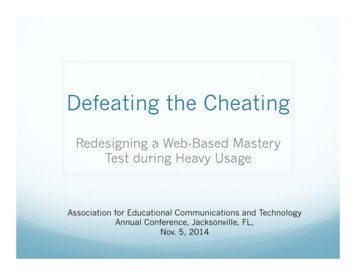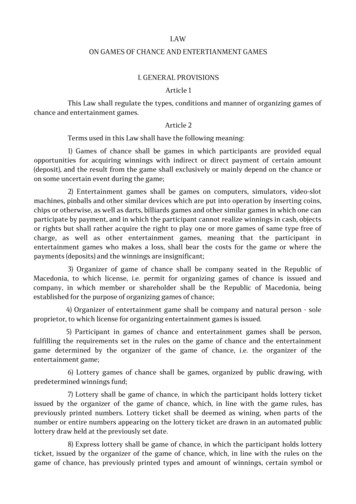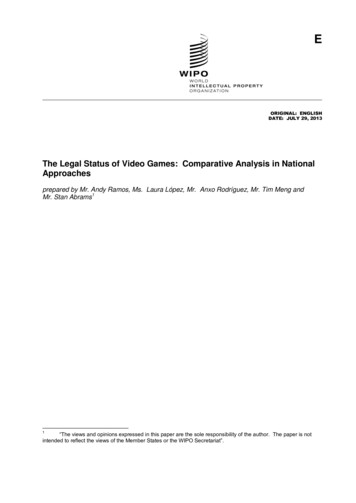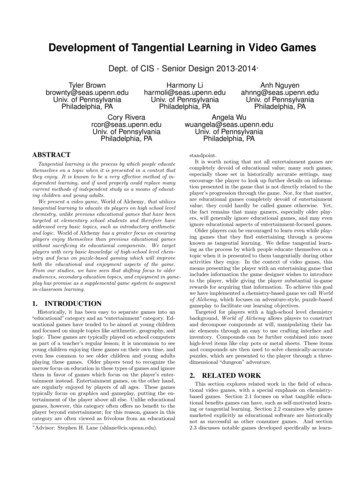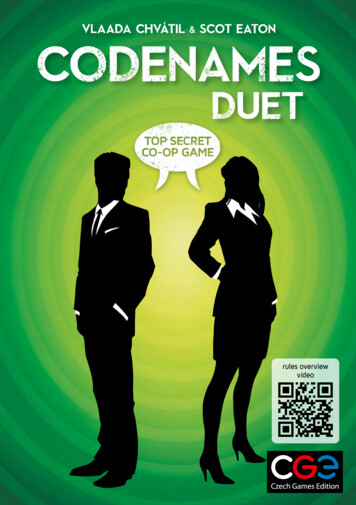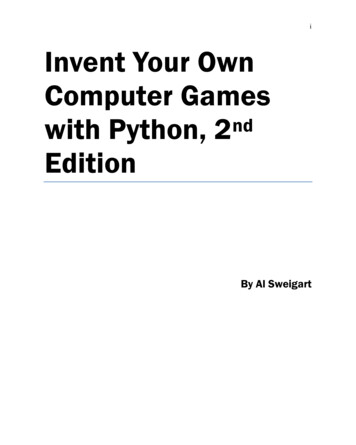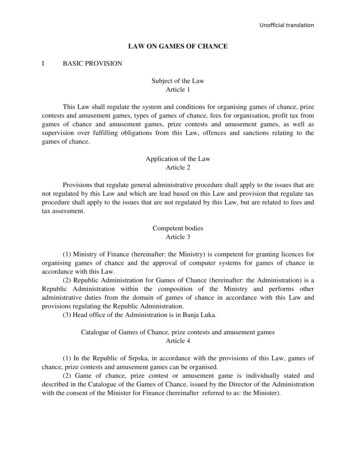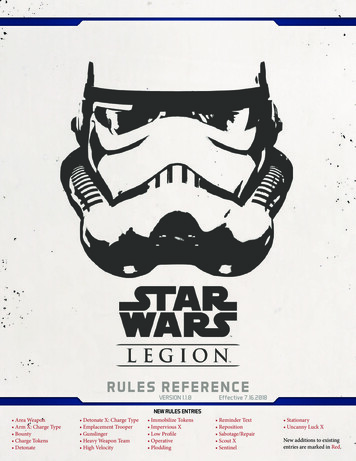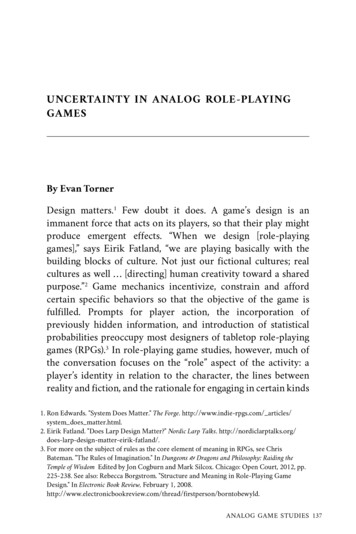
Transcription
Cheating in Multiplayer Video GamesRobert Stafford HardyThesis submitted to the faculty of the Virginia Polytechnic Institute and State Universityin partial fulfillment of the requirements for the degree ofMaster of ScienceInComputer Science and ApplicationsAPPROVED:Steve Harrison, ChairmanDeborah G TatarManuel A. Pérez-QuiñonesApril 15th 2009Blacksburg, VirginiaKeywords: Cheating, Video Games, ConsequencesCopyright 2009 Robert S. Hardy
Cheating in Multiplayer Video GamesRobert S. HardySteve Harrison, ChairmanABSTRACTCheating in video games has been prevalent ever since the days of Pong. Gameshave evolved much since then and the ways in which people play together have changedas well. Older systems required people to play together in the same room, but with theadvent of the internet, gaming consoles allow us to play games together with peoplelocated all over the globe. Cheating has evolved as well, since gamers no longer have theluxury of monitoring the person sitting next to them; anti-cheating mechanisms are builtinto most online systems and suspicious behavior is monitored by gaming companies.Most of the current research has surrounded ways in which players cheat and theirreasoning for doing so. This is only half of the equation however, what happens after agamer is caught cheating? What are the repercussions for being caught cheating and howdoes being caught influence future decisions to cheat? By putting gamers in a situationwhere they are caught cheating, three different responses were revealed: those who aredetermined to cheat no matter what, those who scale back their cheating in the hopes together.
Table of ContentsAbstractiiList of FiguresivList of Tablesiv1 Introduction1.1 Problem area011.2 Specific problem021.3 Claim1.3.1 Reasons and Evidence021.3.2 Acknowledgements and responses031.3.3 Warrants042 Previous Work2.1 The moral implications of cheating in video games052.2 Motive for cheating052.3 Methods of cheating062.4 Software hacks and exploitation072.5 Preventing cheating072.6 Repercussions of cheating082.7 Economic Impact083 Methodology3.1 Overview103.2 Choosing the game103.3 Designing the cheats113.4 Setting up the experiment3.4.1 The map113.4.2 The questionnaires143.5 Execution3.5.1 Setup153.5.2 Game play154 Results and Discussion4.1 Expected Results164.2 Unexpected Findings195 Future Workiii
5.1 The player base225.2 The process225.3 Ideas for continuation23References25List of FiguresFigure 3.4.1.1 Overhead layout of the map12Figure 3.4.1.2 Cheats in the player’s base13List of TablesTable 1.3.3 Games that gamers associated with/quit due to cheating04Table 4.1.1 Perceived chance to be caught of people ejected from the first game16Table 4.1.2 Perceived chance to be caught of people not ejected from the first game17Table 4.1.3 Comparison of cheating during Game 1 vs. Game 217Table 4.1.4 Perceived risk of being caught vs. cheating in game one19Table 4.2 Correlation between perceived skill and tendency to cheat20iv
Chapter 1 Introduction1.1 Problem areaCheating in video games is a big problem for both players and companies alike.Imagine playing in a fair fight with an opponent when all of a sudden you find yourselfoverwhelmed with an attack that would otherwise be impossible to achieve. Whenplayers who attempt to play by the rules are put in a situation like this, it becomes veryeasy to gain a negative view of the game or its developers. Players can be discouraged byrampant cheating and stop playing the game altogether. This translates to loss of revenuefor game developers and influences not only the current game but their future work aswell. But what actual effect does this have on the cheaters?In single player games such as Solitaire, cheating only extends as far as the personwho is cheating; cheating only serves to be self deceiving as the real challenge is notagainst another person but instead yourself. In a physical game of Solitaire this mightequate to bending the rules a little and adding another column so that the player can bettermanipulate the cards. In the world of computerized gaming however, such rules onlyexist if they are programmed. Thus such cheats fall into three categories: cheats createdby the developer of the game intentionally, exploits in the game that are either the resultsof buggy code or development features that were meant to be removed, and third partycode that modifies the game in a way that the developer had not intended. Cheats left inintentionally by the programs typically only exist in single player modes. Many reasonsexist for this but typically it is for added value or to allow the player to move past adifficult section. These single player cheats do not usually move beyond single playerbecause of issues of fairness and defining the actual rules of the game. What thisresearch focuses on is the latter two types of cheats, the exploits and game modificationsbecause they tend to affect multi-player modes.The research in this field does a nice job of defining the motivations for cheating[1], the actual methods of cheating [3, 4] and the ways companies deal with it [7] andhow that translates to the gamer [15]. The current literature does not examine whyplayers continue to cheat or what happens after the gamer makes the decision to cheat? Aspecific game console or account may be banned from an online service but there is no1
user tracking involved; the current literature stops there. Other questions left unansweredin the literature are: What aspects of games in particular lead players to cheat assuming allother things are equal (same player goals, same opponent difficulty, etc)? How does getting caught cheating affect a player’s perceptions of cheatingin the future? Do players who have been caught cheating stop/cheat less/cheat more?These are all questions that the current literature does not address and have been leftunanswered.1.2 Specific problemThis research seeks to answer some of the questions posed above, namely howbeing caught cheating affects a player’s tendency to cheat in the future. This might belikened to how convicts react after run-ins with the law; some people reform while somecontinue to be repeat offenders. The other question is how does a gamer’s perception ofbeing caught affect their likelihood of cheating? Much like fake security cameras candeter theft because criminals cannot tell if they are real or not [8], how do securitysystems (or the perception of them) in video games deter cheating? The aftereffects ofcheating and how it changes people’s perceptions are currently missing from theavailable literature and answering those two questions is what this research attempts toanswer.1.3 Claim1.3.1 Reasons and EvidencePast personal experience has shown that being banned from a gaming system isnot enough to deter a person from coming back to the game again. Cheating typicallylends itself to making the game easier, and those who cheat have a much easier timestarting from nothing and arriving back at their former glory in short order with suchcheats. However, it does seem that people will try to do as much as they can whilestaying under the radar of anti-cheating detection systems.2
Blizzard’s anti-cheating detection system Warden works on many different levelsand cheaters playing many of Blizzard’s different games do what they can to stay underthe radar. The key to Warden however is that every time a client connects to the server,instructions for Warden are sent to the client and executed; this makes Wardencompletely dynamic for what it can detect. Cheaters tend to get around Warden byperforming a hash on the data sent to it, if the hash is different then most cheaters turn offtheir cheats as a countermeasure until it can be determined what the newest version ofWarden can do.However, knowing the automated system’s anti-cheating policies is only half thebattle for a cheater. Other players in the game also have the ability to recognize a personcheating in ways that an anti-cheat detection system could not. For example, a programthat does nothing more than emulates key presses to completely automate playerbehavior; this is called botting. Botting is easily detectable to the human eye since theplayer does the same thing over and over again, but to a machine this can be very difficultto detect. Part of slipping under the radar is knowing how to limit automated or cheatingbehavior so that it is too sparse to detect by either man or machine.This level of evasion is the basis for the questions in this thesis. Watching howcheaters determine the capabilities of the system and attempt to circumvent them, andseeing what their reaction is after being caught.1.3.2 Acknowledgments and ResponsesOne of the toughest problems with this type of research is finding both peoplewho have cheated in the past and people who are familiar with the game being used forthe research. This is actually a fair problem and one that is difficult to address without aconflict of interest. In order to conduct a study such as this using custom cheats (whichwill be discussed later), cheaters familiar with the game would not be able to take thestudy seriously because they know the cheats are not actual cheats in the game and inferthat things like anti-cheat detection are not really occurring either.Actually finding people who cheat and know the game considerably well isanother problem. Finding one or the other would not be difficult, due to the large numberof games out there, but the cheating population is only a small subset of a particular game3
(for the most case). There are resources online such as cheating/hacking/exploit forums,but making use of them does not necessarily guarantee someone who is really willing tohelp you with your research; they may want to derail it instead.1.3.3 WarrantsCheating in games is an issue that not only affects the quality of the fun playershave, but one that also has an economic impact in many cases. Determining how gamersrespond to attempts to deter them from cheating is important because cheating directlyimpacts the quality of service (QoS) that the provider is able to give us. Games with poorQoS are no fun to play and typically hemorrhage gamers. A poll (in Figure 1.3.3)conducted during the course of the research revealed the games that gamers associatedwith cheating. The follow-up question to this was what games people actively stoppedplaying due to cheats. The correlation between the two is apparent; about one out ofevery five people stopped playing or avoided a game due to cheats. If a correlationbetween the strength of an anti-cheating system and the chances of cheating occurring, ora correlation showing that certain consequences reduced cheating in games, then gamescould be strengthened with these results and providers could provide a better quality ofservice to gamers worldwide.Table 1.3.3 Games that gamers associated with/quit due to cheatingGameDiablo I/IIWorld of WarcraftCounterstrikeSOCOMGears of WarNeverwinter NightsUltima OnlineRunescapeHelbreathSoldier of FortuneUnreal TournamentRagnarokAssociated with cheating6421111111114Quit due to cheating201000000001
Chapter 2 Previous Works2.1 The implications of cheating in video gamesKimppa et al. give a nice overview of the moral implications of cheating. In short,cheating in single player games serves only the purpose of deceiving yourself. In groupplay, the same behavior carries a different meaning [3]. Piaget has a fascinating exampleof the play of young children. They immediately have a negative response towards otherchildren who are cheating not because they understand the concepts of right and wrongbut simply because it makes the game less interesting [16]. Most people play games forenjoyment and perceived value.There is a lot of perceived value in multiplayer games. Most multiplayer gameskeep some sort of persistent incentive to play such as scoreboards, ladder matches, andcharacter advancement. The problem with cheating in multiplayer games is that you areno longer deceiving yourself, but instead you force someone to “incur a loss in perceivedvalue” [3]. This could even be a loss of real value in games where the currency has adirect real world equal (such as Second Life) or as Smith mentions that rampant cheatingcan change gamers’ view of a service and cause the provider to lose subscriptions due toplayer’s negative perception of the service [4]. Some players perceive such a great lossthat they take others to court over such Imaginary Property or, as an article at ABC Newsstates, even kill one another [10]. Most forms of cheating in games have been written offas if it were the same as cheating in a game of chess [4], but the consequences can bevery real.2.2 Motive for cheatingOutside of the gaming world, there are many motives for cheating and bendingthe rules. One such example is the case of Lee-Allen University in which a basketballplayer had a failed grade illegally expunged from his record to keep him eligible forathletics. In this case he took the team on to a national championship which earned himan MVP and a lot of accolades for his school that would not have been received if therecord had not been expunged. In this case, the president of the university went against5
the university’s moral code by trying to better Lee-Allen [17]. But this type of situationis also commonly found in games.Some methods that might be considered cheating or grief play are actuallyencouraged in some games due to their nature.The best example of this is theMMORPG Everquest which was lovingly referred to by its players as “Evercamp” [21].In the video game context, camping refers to waiting around for an enemy to appear sothat it can be killed. The goal is either to obtain a reward or to engage in grief play anddeny another player enjoyment of the game. As much as the designers of Everquest triedto discourage camping of monsters the allure of
Thus such cheats fall into three categories: cheats created by the developer of the game intentionally, exploits in the game that are either the results of buggy code or development features that were meant to be removed, and third party code that modifies the game in a way that the developer had not intended. Cheats left in intentionally by the programs typically only exist in single player .

